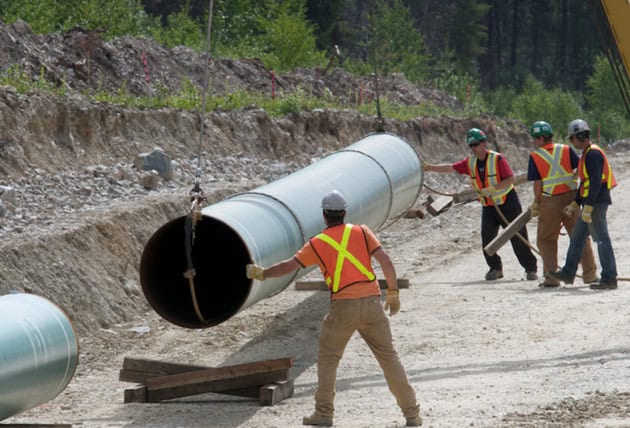
Trans Mountain Corp. is planning to continue its planned construction work on its pipeline expansion project this fall, despite a court ruling earlier this week that raised questions about whether the work will once again be halted.
On Aug. 4, the Federal Court of Appeal granted leave to appeal to First Nations challenging the federal government’s approval of the multi-billion pipeline twinning project.
“We have received the Federal Court of Appeal decision,” Trans Mountain said in an email. “Trans Mountain is confident in the certificates and approvals obtained to date and we look forward to building and operating this project in a manner that minimizes impacts to the environment and provides benefits to all Canadians.
“As these cases make their way through the courts, we will continue with all aspects of planning and construction. The applications are challenging the decisions made by the Canada Energy Regulator and the Federal Government, but do not in and of themselves negate the pre-existing approvals provided by those governmental authorities until and unless the court rules otherwise.”
Environmental groups and First Nations brought a dozen motions forward in a leave to appeal. The federal court rejected six, but allowed six – all by First Nations – to proceed.
In dismissing some of the applications, costs were awarded to Trans Mountain.
The court decision was unusual in that the court actually published a detailed written reason for granting the leave to appeal – something it doesn’t normally do – and also spelled out the limits, both in scope and time, of the appeal hearing.
The court ruled the appeal must focus solely on the question of whether later stage negotiations with First Nations were adequate. None of the arguments dealt with in previous court cases will be retried and no new arguments will be heard.
Much was made of the fact that the federal government offered no argument against the leave to appeal – something that the court itself suggested was unusual.
“The court’s standing practice is not to issue reasons in disposing of leave applications,” Justice David Stratas wrote.
“However this is an exceptional case as the respondents (the federal government), who have a direct interest in the project, took no position for or against the leave applications in all cases but one, thereby leaving the matter to the discretion of the Court.
“Taking no position on a motion is a common practice when dealing with procedural matters; it is not when issues of general importance are in play.”
The federal government’s lack of a response to the leave to appeal applications has been viewed by some as evidence the Trudeau government is only going through the motions and would be relieved if the project was killed by the courts.
Geoff Plant, a former B.C. attorney general currently a partner with GLGZ LLP law firm, said the federal government’s position – i.e. taking no position in the appeal application – is understandable.
He said the bar for granting a leave to appeal is low. Agreeing to hear an appeal by no means guarantees it will succeed.
“It’s perfectly understandable why a respondent to such an application might decide not to appear and argue whether leave should be granted, given how low the threshold is and, to be perfectly blunt, the unlikelihood that a single judge of the Federal Court of Appeal would have the fortitude to completely shut the door on any judicial scrutiny of the Cabinet’s decision.
“If I were advising Canada on this matter I would have said that there was no – and I mean zero – chance of successfully opposing every single one of the dozen applications.”
Last year, the same Federal Court of Appeal quashed an order in council that allowed the Trans Mountain expansion to proceed. The court found the National Energy Board (NEB) failed to properly consider the marine impacts of increased oil tanker traffic.
It also found the phase 3 consultations with First Nations inadequate. After addressing both those issues, the federal government once again gave the Trans Mountain expansion the green light in June.
First Nations and environmental groups then appealed the second order in council.
While granting First Nations the leave to appeal, Stratas also pointed out that proper consultation does not mean First Nations must be fully satisfied with the consultations.
“Dissatisfaction, disappointment or disagreement with the outcome reached after consultation is not enough to trigger a breach of the duty,” he writes.
“Under the duty to consult, First Nations and Indigenous peoples do not have a right to veto a project.”


